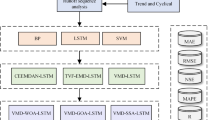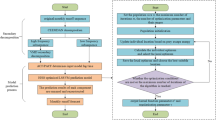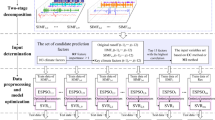Abstract
Effective monthly runoff prediction is crucial for reservoir scheduling, water resources management, and efficient utilization. To enhance the accuracy and stability of these predictions, this study proposes a data-driven modeling method based on Variational Mode Decomposition (VMD) and multi-strategy enhanced Artificial Rabbit Optimization algorithm (MARO), combined with Support Vector Regression (SVR) for prediction. Firstly, VMD is used to extract multi-scale features from the time series to address nonlinear and non-stationary issues. Then, MARO is employed to optimize the parameters of the SVR model. The MARO algorithm introduces adaptive weight factors, elite opposition-based learning, and a random walk strategy, significantly improving the accuracy of parameter optimization. Additionally, an error correction mechanism based on MARO-SVR is introduced to further enhance the reliability of the prediction model. The model is applied to monthly runoff predictions in the Xiajiang hydrological station in the Ganjiang River Basin and the Jiayuguan Hydrological station in the Heihe River Basin, and validated using five evaluation metrics: MAE, RMSE, MAPE, NSEC, and R. Results indicate that the VMD-MARO-SVR-EC model reduces overall errors by 75.12% in the Xiajiang hydrological station and by 80.6% in the Jiayuguan Hydrological station, significantly improving prediction accuracy and adaptability to complex runoff variations. These findings provide a new approach for monthly runoff forecasting and offer robust support for practical applications in watershed water resource management.


















Similar content being viewed by others
Data availability
The data are available from the corresponding author on reasonable request.
References
Alfasanah Z, Niam MZH, Wardiani S, Ahsan M, Lee MH (2025) Monitoring air quality index with EWMA and individual charts using XGBoost and SVR residuals. MethodsX 14:103107. https://doi.org/10.1016/j.mex.2024.103107
Chen B, Chen Z, Song C, Song Y (2024) Integrated forecasting method of medium-and long-term runoff by ridge regression based on optimal sub-model selection. Water Supply 24:799–811. https://doi.org/10.2166/ws.2024.033
Dragomiretskiy K, Zosso D (2014) Variational mode decomposition. IEEE Trans Signal Process 62:531–544. https://doi.org/10.1109/TSP.2013.2288675
Durgut PG, Tozak MB, Ayvaz MT (2024) SHuffled Ant Lion Optimization approach with an exponentially weighted random walk strategy. Neural Comput Appl 36:10475–10499. https://doi.org/10.1007/s00521-024-09566-5
Gan M, Pan H, Chen Y, Pan S (2021) Application of the variational mode decomposition (VMD) method to river tides. Estuar Coast Shelf Sci 261. https://doi.org/10.1016/j.ecss.2021.107570
Gao S, Huang Y, Zhang S, Han J, Wang G, Zhang M, Lin Q (2020) Short-term runoff prediction with GRU and LSTM networks without requiring time step optimization during sample generation. J Hydrol 589. https://doi.org/10.1016/j.jhydrol.2020.125188
Garcia-Nieto PJ, Garcia-Gonzalo E, Sanchez Lasheras F, Alonso Fernandez JR, Diaz Muniz C (2020) A hybrid DE optimized wavelet kernel SVR-based technique for algal atypical proliferation forecast in La Barca reservoir: A case study. J Comput Appl Math 366. https://doi.org/10.1016/j.cam.2019.112417
Geng D, Zhang Y, Zhang Y, Qu X, Li L (2025) A hybrid model based on CapSA-VMD-ResNet-GRU-attention mechanism for ultra-short-term and short-term wind speed prediction. Renewable Energy 240:122191. https://doi.org/10.1016/j.renene.2024.122191
Guo S, Wen Y, Zhang X, Chen H (2023) Monthly runoff prediction using the VMD-LSTM-Transformer hybrid model: a case study of the Miyun Reservoir in Beijing. J Water Clim Chang 14:3221–3236. https://doi.org/10.2166/wcc.2023.257
Han M, Zhang C, Yin S, Jia J, Kim C (2024) Optimization design of indoor environmental ventilation in buildings based on improved SVR-PSO model. Sustainability 16. https://doi.org/10.3390/su16125256
Hu G, Huang F, Chen K, Wei G (2024) MNEARO: a meta swarm intelligence optimization algorithm for engineering applications. Comput Methods Appl Mech Eng 419:116664. https://doi.org/10.1016/j.cma.2023.116664
Jehanzaib M, Ajmal M, Achite M, Kim T-W (2022) Comprehensive review: advancements in rainfall-runoff modelling for flood mitigation. Climate 10:147. https://doi.org/10.3390/cli10100147
Kontopoulou VI, Panagopoulos AD, Kakkos I, Matsopoulos GK (2023) A review of ARIMA vs. machine learning approaches for time series forecasting in data driven networks. Futur Internet 15:255. https://doi.org/10.3390/fi15080255
Li Y, Wang D, Wei J, Li B, Xu B, Xu Y, Huang H (2021) A medium and long-term runoff forecast method based on massive meteorological data and machine learning algorithms. Water 13. https://doi.org/10.3390/w13091308
Li F, Zhang G, Hu S (2022) An Algorithm for optimal allocation of water resources in receiving areas based on adaptive decreasing inertia weights. J Adv Transp 2022. https://doi.org/10.1155/2022/3329628
Liang Z, Li Y, Hu Y, Li B, Wang J (2018) A data-driven SVR model for long-term runoff prediction and uncertainty analysis based on the Bayesian framework. Theoret Appl Climatol 133:137–149. https://doi.org/10.1007/s00704-017-2186-6
Mirjalili S, Mirjalili SM, Lewis A (2014) Grey wolf optimizer. Adv Eng Softw 69:46–61. https://doi.org/10.1016/j.advengsoft.2013.12.007
Priyadarshi M, Das P, Hussain A, Aswathy R, Laskar SM (2025) Prediction of specific methanogenic activity of anaerobic sludges from sewage treatment plants of Delhi, India based on SVR model. Fuel 385:134119. https://doi.org/10.1016/j.fuel.2024.134119
Qiang Z, Qiaoping F, Xingjun H, Jun L (2020) Parameter estimation of muskingum model based on whale optimization algorithm with elite opposition-based learning. IOP Conf Ser: Mater Sci Eng 780:022013. https://doi.org/10.1088/1757-899X/780/2/022013
Wang P, Chudhery MAZ, Xu J, Zhao X, Wang C (2023b) A two-stage interval-valued carbon price forecasting model based on bivariate empirical mode decomposition and error correction. Environ Sci Pollut Res 30:78262–78278. https://doi.org/10.1007/s11356-023-27822-4
Wang W-c, Wang B, Chau K-w, Xu D-m (2023d) Monthly runoff time series interval prediction based on WOA-VMD-LSTM using non-parametric kernel density estimation. Earth Sci Inf 16:2373–2389. https://doi.org/10.1007/s12145-023-01038-z
Wang J, Wang W, Hu X-x, Gu M, Hong Y-h, Zang H-f (2024) A hybrid annual runoff prediction model using echo state network and gated recurrent unit based on sand cat swarm optimization with Markov chain error correction method. J Hydroinf 26:1425–1453. https://doi.org/10.2166/hydro.2024.038
Wang S, Peng H (2024) Multiple spatio-temporal scale runoff forecasting and driving mechanism exploration by K-means optimized XGBoost and SHAP. J Hydrol 630. https://doi.org/10.1016/j.jhydrol.2024.130650
Wang L, Cao Q, Zhang Z, Mirjalili S, Zhao W (2022) Artificial rabbits optimization: A new bio-inspired meta-heuristic algorithm for solving engineering optimization problems. Eng Appl Artif Intell 114. https://doi.org/10.1016/j.engappai.2022.105082
Wang J, Wang X, Li X, Yi J (2023a) A hybrid particle swarm optimization algorithm with dynamic adjustment of inertia weight based on a new feature selection method to optimize svm parameters. Entropy 25. https://doi.org/10.3390/e25030531
Wang W-c, Cheng Q, Chau K-w, Hu H, Zang H-f, Xu D-m (2023c) An enhanced monthly runoff time series prediction using extreme learning machine optimized by salp swarm algorithm based on time varying filtering based empirical mode decomposition. J Hydrol 620. https://doi.org/10.1016/j.jhydrol.2023.129460
Xu D-m, Liao A-d, Wang W, Tian W-c, Zang H-f (2023) Improved monthly runoff time series prediction using the CABES-LSTM mixture model based on CEEMDAN-VMD decomposition. J Hydroinf 26:255–283. https://doi.org/10.2166/hydro.2023.216
Xu D-m, Hu X-x, Wang W-c, Chau K-w, Zang H-f, Wang J (2024a) A new hybrid model for monthly runoff prediction using ELMAN neural network based on decomposition-integration structure with local error correction method. Expert Syst Appl 238:121719. https://doi.org/10.1016/j.eswa.2023.121719
Xu D-m, Li Z, Wang W-c (2024b) An ensemble model for monthly runoff prediction using least squares support vector machine based on variational modal decomposition with dung beetle optimization algorithm and error correction strategy. J Hydrol 629:130558. https://doi.org/10.1016/j.jhydrol.2023.130558
Xu D-m, Li Z, Wang W-c (2024c) An ensemble model for monthly runoff prediction using least squares support vector machine based on variational modal decomposition with dung beetle optimization algorithm and error correction strategy. J Hydrol 629. https://doi.org/10.1016/j.jhydrol.2023.130558
Yang H, Li W (2023) Data Decomposition, Seasonal Adjustment Method and Machine Learning Combined for Runoff Prediction: A Case Study. Water Resour Manage 37:557–581. https://doi.org/10.1007/s11269-022-03389-6
Zhang GP (2003) Time series forecasting using a hybrid ARIMA and neural network model. Neurocomputing 50:159–175. https://doi.org/10.1016/S0925-2312(01)00702-0
Funding
The support of the special project for collaborative innovation of science and technology in 2021 (No: 202121206).
Author information
Authors and Affiliations
Contributions
Ni–ni He: Data curation, Formal analysis, Investigation, Methodology, Software, Writing – original draft. Wen-chuan Wang: Conceptualization, Formal analysis, Funding acquisition, Methodology, Writing – original draft.
Corresponding author
Ethics declarations
Competing interest
The authors declare no competing interests.
Additional information
Communicated by: Hassan Babaie
Publisher's Note
Springer Nature remains neutral with regard to jurisdictional claims in published maps and institutional affiliations.
Rights and permissions
Springer Nature or its licensor (e.g. a society or other partner) holds exclusive rights to this article under a publishing agreement with the author(s) or other rightsholder(s); author self-archiving of the accepted manuscript version of this article is solely governed by the terms of such publishing agreement and applicable law.
About this article
Cite this article
He, Nn., Wang, Wc. Enhancing monthly runoff prediction: a data-driven framework integrating variational mode decomposition, enhanced artificial rabbit optimization, support vector regression, and error correction. Earth Sci Inform 18, 265 (2025). https://doi.org/10.1007/s12145-025-01767-3
Received:
Accepted:
Published:
DOI: https://doi.org/10.1007/s12145-025-01767-3




